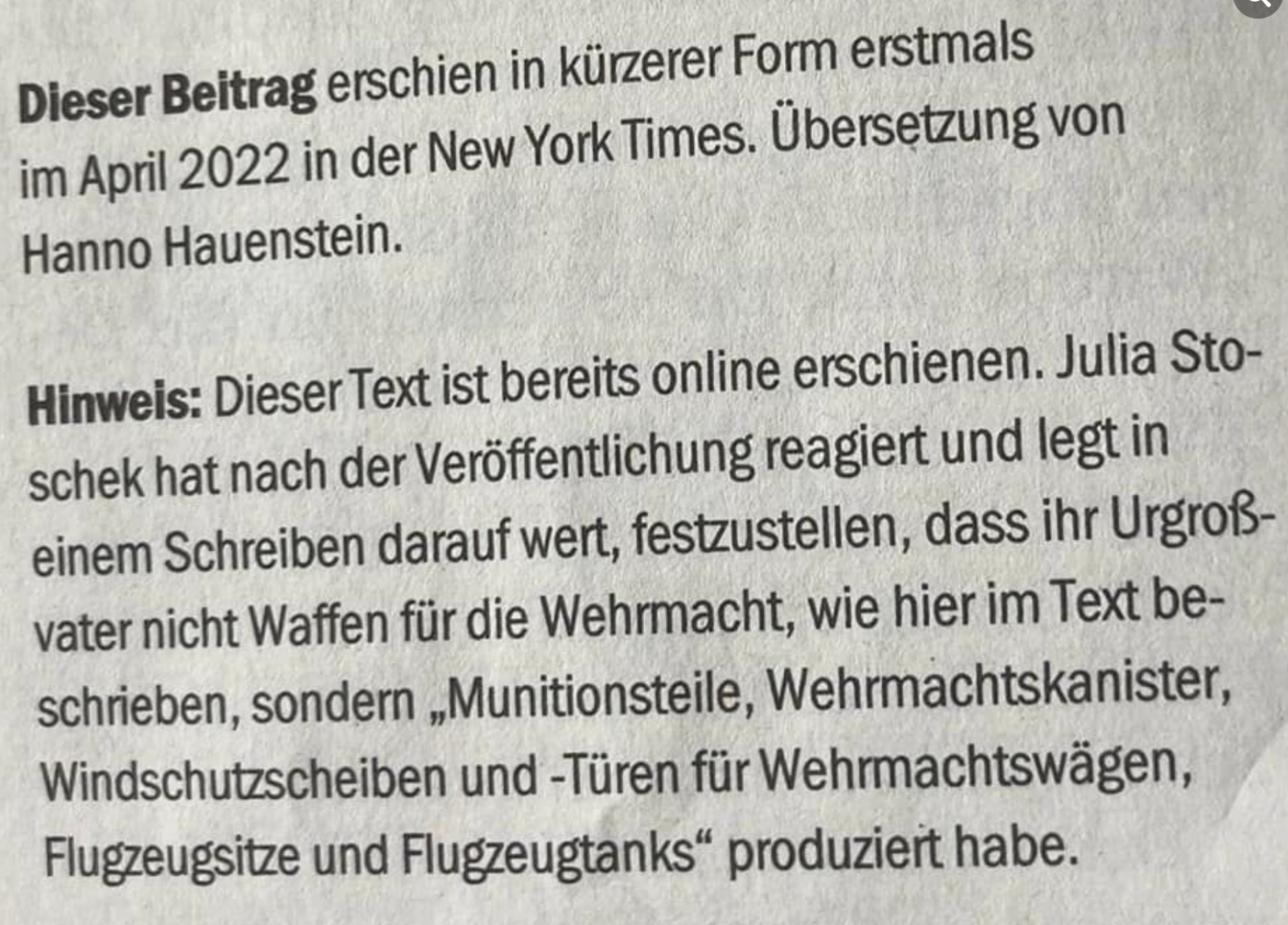on nonideological privilege
on nonideological privilege

Why dont we want our rich people to fail?
Let's talk about it. I am summarizing (and commenting) this NYT article which you can have free access to here.
Julia Stoschek’s great-grandfather, the German industrialist Max Brose, was a member of the Nazi Party. During World War II, his automotive company manufactured gasoline canisters and armaments for the German military, partly using forced labor. The family has long said that Brose was a nonideological member of the Nazi Party who treated his company’s forced laborers, primarily Soviet prisoners of war, well. Maybe not well enough to get a movie out of it, but they did commission a book in 2008. “Brose: A German Family Company” by historian Gregor Schöllgenwhich paints a rather rosy image of the family’s past, offering no historical references or footnotes ( family claims the evidence is “available upon request,” like prices for a Jeff Koons installation).

not guns, but parts of guns
According to the Bavarian State Archive, Brose was ultimately classified as a “follower,” the second-lowest of five levels of complicity to the Nazi party in the denazification trials that followed the war. Denazification, yes that is a word. A “follower” was generally defined as a nominal member of the Nazi Party, who took part in only basic or mandatory party activities, hence the “nonideological” claim the family makes. Guess who the “supporting witnesses” in these trials were? Brose's employees. No coercion here. Brose’s defense lawyers (plural) claimed he took a leadership position in a regional business association primarily to limit the Nazis’ “influence on local economic administration.”
A rich, influential, slightly Nazi, Robin Hood of sorts. Hey the family even eventually managed to get a street named after the great Grand father in Coburg.
.png)
Listen. You wont be able to turn a stone in Germany without finding connections to THAT past. The German Pavillion in Venice (rebuilt by party member Ernst Haiger's design in 1938) has been deconstructed and reconstructed and poked and probed over the years through various artistic interventions ( all very civilized, of course). Werner Haftmann, the academic pacesetter of the first three documentas, the man who conceptualised the exhibition in its current form was an SA SA-Partisanenjäger and NS- Kriegsverbrecher ( if that sounds horrible, is because it is). The details in the documentation of the Deutsches Historisches Museum (DHM), which has done an excellent job of researching the documenta and its makers in recent years, are eye opening. Haftmann was also the Founding Director of the Neue National Gallerie in Berlin (1967-1974). We dont hear much about that in Berlin. Guess who got voted in the board in 2020?
It is a Nazi Bingo.
Stoschek has long insisted she welcomes any scrutiny on her family’s history, claiming that there is no throughline between the money she invests in her collection and the work carried out by Brose’s company during the Third Reich. She emphasizes that Brose's company was left in shambles after the war. Duh. The path to rebuilding generational wealth is, of course, open to a family that gets to keep their lives, their property, equipment, influence on employees, ability to hire defense lawyers, commission books, strong arm city board into naming streets after them, buy progressive art and so on. Her progressive art collection does seem to be Stoscheck's main whitewashing argument, delegating the moral responsibility to deal with her family's past to the artists she buys and "supports".
Art patronage ( and philanthropy) as a money and crime laundry scheme is nothing new, it is in fact so common it should be included in its dictionary defintion. And if we start pulling threads from that rug, well, that will make for A LOT of uncomfortable gallery dinners. See, ahem, Zabludowicz collection. (Another interesting word; deauthor).
Well, now that artists and cultural producers are starting to speak up (Edwn An here in a recent social media post) and withdraw works from her collection, Hito Steyerl for example, who is in the process of buying back her piece, maybe a progressice collector like JS will be more open to talk about reparations and the ongoing denazification process in Germany and especially in the German cultural scene.
Or you know, double down and sue the Berliner Zeitung for this article ( basically a translation of the NYT article)
Artists Candice Breiz and Zoe Miller on social media have often hosted interesting discussions and collection of links (and memes). I am sure there are many more - you can always email or msg us!
Another NYT article ( free access) here
I have now mentioned Hito Steyerl's name for five newsletters in a row.
To subcribe to slightly less censored version of this newsletter click here